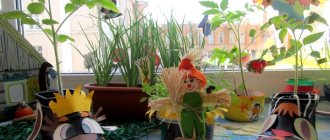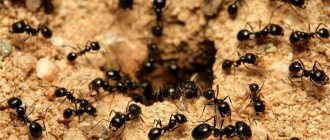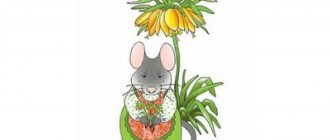A selection of fiction on the topic “Houseplants”
Show the children drawings of Pike Tail (Sansevieria) and other flowers mentioned in the story. Name plants that resemble animals, birds or fish in their appearance.
Do you know plants whose leaves can produce roots?
Do you think that if the plants knew that Piketail was a sensitive creature, would they laugh at him?
Which indoor plants seem to you to be fragile and sensitive creatures?
What was Pike Tail like from the fairy tale? Why did he consider himself unworthy of kindergarten? Draw Pike Tail at the beginning and end of the story.
Why did Maria fall in love with Pike Tail? Do you think a flower would have grown out of Pike Tail if Maria had not believed in it?
What did the flower born from Pike Tail think? Write a fairy tale about how the flower lived behind its strong leaves.
What did Pike Tail teach the plants? Write a fairy tale about how plants and Pike Tail became friends.
What do you think the white cat thought when a flower appeared from the Pike Tail?
MEDICINES IN FLOWER POTS
One afternoon, the inhabitants of Maria's indoor kindergarten were enjoying violin music broadcast on the radio. The plants loved music very much, and often Maria deliberately left the radio on when she knew that good music would be broadcast. Aspidistra with fluttering dark green wide leaves reminiscent of flags on strong long petioles, comfortably nestled under the canopy of the feathery leaves of a tall Palm Tree, was talking in a low voice with a young red-yellow Tulip. “I look at you, dear Aspidistra, and I’m a little jealous: what a big and friendly family you have!” How fun you all must be living together?! How many of you are in your glorious family? - asked the colorful Tulip, which grew from a bulb and recently blossomed to the wonder of everyone. - At the moment there are seventeen of us: grandfather, grandmother, mother, father and us - thirteen children. “We are all very similar to the leaves of the Lily of the Valley, only we are several times larger than them,” Aspidistra answered proudly. - Yes, yes, I see! And aren't you cramped in your pot? It’s amazing how you all get along in such a small living space?! - Tulip was surprised. - In crowded but not mad! We are always very patient and do not interfere with each other, but, on the contrary, support the weakest and oldest. For this we were nicknamed “Friendly Family”. Aspidistra is our scientific name. We do not turn yellow, do not turn pale, are forever green and never fall off. We do not wither even if they forget to water us, and we can grow beautifully both in a dark corner and in the brightest sun. And we are not afraid of drafts, and dust is not scary for us,” Aspidistra answered willingly. - Really!? You are simply an exceptional plant in its unpretentiousness. “I don’t have enough words, madam, to express my admiration for you,” Tulip admired. - And I feel so sad alone. - Well, what are you talking about, dear Tulip! You are the decoration of our kindergarten! Don't be sad, please! - Aspidistra said. At these words, the tulip joyfully opened its cup, from which curious antennae peeked out. Their peaceful conversation was suddenly interrupted by someone’s exclamation: “Hush, they’re talking about our respected Centennial on the radio!” - Wake up, Grandfather Stoletnik! Listen to what they say about you,” the round Cactus baby woke up the peacefully dozing Agave. Indeed, they talked about Stoletnik on the radio. The program was dedicated to traditional medicine, and the doctor of medical sciences spoke about the healing properties of Aloe (the scientific name of Agave). Everyone was surprised to hear that Stoletnik is a universal doctor who treats bronchitis, tuberculosis, inflammation of the gums, stomach ulcers, and even eye diseases. Its juicy, fleshy leaves contain healing juice - aloin, which is very useful, especially for inflammation. The white cat, who was listening attentively to the radio broadcast, immediately hurried to Stoletnik and meowed: “Dear Stoletnik, I just have an inflamed gum, I can’t eat anything.” Please allow me to bite off one of your healing leaves. - For God's sake, at least two. Just chew it properly, my juice is quite bitter,” Stoletnik said good-naturedly, flattered by the doctor of sciences’ story from the radio broadcast. The evergreen Kalanchoe, which wonderfully blossomed with small scarlet flowers, shook its succulent stems and oval leaves: “I may not be as famous as our respected Agave, but my juice is also used in medicine, especially in healing wounds and burns.” It perfectly destroys the infection. It is especially effective for sore throat, gum disease and stomatitis. So my juice is no worse than yours, dear Agave. You can even buy it at a pharmacy. You, white cat, can chew my leaf too. “I’m very grateful, dear Kalanchoe, I’ll definitely try it,” the white cat answered politely, without ceasing to chew the bitter leaf of the Agave. Here the modest Ivy thought that it would be nice if everyone knew what he was capable of: “I can heal too.” Decoctions from my leaves are very helpful for coughs and headaches. I am used against calluses and tumors. I can even lower blood pressure and remove warts and... What started here! The ivy excited the kindergarten inhabitants so much that they began vying with each other to boast about their healing properties. If Maria could hear them, she would stop going to the pharmacy for medicine once and for all! But, alas! She did not understand the language of plants. Only by their appearance and thanks to her kind and sensitive heart, she guessed about the moods and problems of her dear pets. Now Maria was lying with a painful headache that would not go away. She had already taken the medicine and was waiting for the doctor to arrive. And the white cat, when he heard that Ivy could remove warts, was delighted and meowed loudly - after all, a huge wart had long been growing on the pink pad of his right front paw, which was causing him a lot of trouble. “First I’ll cure the gum, and then I’ll take care of the wart. How nice it is to have real doctors at home!” - he thought with joyful gratitude. And at that moment Tradescantia entered the arena of boasting: “Listen, dear friends!” I am the most common houseplant, but can significantly lower blood sugar in diabetes. For dysentery and colds, there is no better remedy than a decoction of my leaves. If you apply my leaves to the tumor and hold it for a while, it will certainly resolve. I'm not bragging, but you all should know about my wonderful abilities. Maria needs this first of all - she seems to have high blood sugar. I found out about this by chance when she was talking to someone on the phone. “It’s not her who has high blood sugar, but her friend Sonechka,” the handsome Croton corrected Tradescantia. - You, as always, got everything mixed up. - Just think, we've found another smart guy. Is this important?! Maria still needs to know what I’m capable of,” Tradescantia stubbornly insisted. - Can you, Friendly Family, also heal? - Tulip asked his kind neighbor. - Yes, in medicine, decoctions from our roots, stems and leaves are very famous, especially in the treatment of intestinal and gastric disorders. And when muscles hurt, they are simply a salvation. Our wonderful decoctions even remove kidney stones,” Aspidistra answered competently. “That’s great, I need to wrap this around my head,” thought the white cat. — My bladder has been acting up lately, and I have a lot of different problems. Kind Azalea sighed and said sadly: “I don’t have any healing properties, but I would like to help Maria now - she has such a severe migraine.” She can't even stand on her feet because of this. And the doctor never comes. He probably has a lot of patients. After these words from Azalea, all the inhabitants of the kindergarten became sad and anxious. Each of them began to think intently about Maria and wish with all their hearts that the nasty migraine would quickly go away and never again torment their beloved mistress. Old Centenary, groaning, leaned towards Azalea and said: “You, dear Azalea, heal with your kindness and tenderness.” I am sure that not all of your properties have yet been studied. There is definitely something healing about you! And Maria will get better - we all want that. At that moment the doorbell rang. It's the doctor. After a thorough examination, he said: “You have nothing serious.” The blood pressure is slightly increased, which makes you weak. I will not prescribe you strong drugs. First, let's try to reduce blood pressure with the help of medicinal plants. Take infusions of cudweed, hawthorn, motherwort, clover flowers and calendula tincture for 10 days. Eat onions, garlic, beets, blackcurrant jam, lemon with peel. Drink weak green tea. Try to forget about coffee and strong tea, at least for a while. And don't overuse salt. And the most important thing for you now is good sleep. As he was leaving, he looked into the room where Mary’s plants lived, and the wonderful home garden delighted him. Taking a closer look, he exclaimed: “Bah, you have a lot of medicinal plants.” Take Ivy, for example! Did you know that it also perfectly lowers blood pressure?! Then he pointed to Gardenia: “And this beauty cures many serious diseases and is very effective for headaches.” Oh, you and Sansevier are growing. You probably don’t even realize that the smoke from burning Sansevieria leaves is like a headache reliever? Your plants will heal you very quickly, read about their properties,” the doctor advised at parting. Maria felt much better after the doctor’s words. She looked at her plants with curiosity, trying to guess which of them had what properties and thought: “That’s what you are like, it turns out. I didn’t even know that you were all healing!”
A fairy tale about indoor plants for preschoolers
Fairy tale for children 5-7 years old
Educational fairy tale for preschool children “Green Hedgehog”
Author: Natalya Mikhailovna Golyshevskaya, senior teacher of MBDOU “Kindergarten No. 12” in Barnaul Purpose: this material is intended for preschool children Purpose: to expand preschoolers’ ideas about indoor plants Objectives: - to introduce children with features of appearance, structure, growing conditions of indoor plants; — teach how to perform labor actions to care for indoor plants; - develop curiosity, cognitive interest. Once upon a time there lived a Little Cactus. It was round, green and prickly. That's why they called him the Green Hedgehog. But he was prickly only on the outside, but in fact, the Cactus Child was very kind and sympathetic.
Recently, the owner separated him from his mother Cactus and planted him in a beautiful small pot. The little cactus liked his new house, but one thing upset him: plants unknown to him grew around him in large flower pots. But Little Cactus was sociable and inquisitive. He decided to get to know his “neighbors” better, because the Green Hedgehog so wanted to have friends! The first person the Cactus Kid dared to talk to was a plant with a thick, woody trunk, the round leaves of which looked like coins.
“Excuse me, please,” said the Green Hedgehog, a little embarrassed, “what is your name?” “People call me the money tree, people believe that I bring wealth and prosperity to the house, but scientifically I am called the tree crassula,” answered the tree. My homeland is the African savannah, so I love the sun. I also love it when my pot is turned from time to time, then I grow into a slender and beautiful tree. - Tell me, aren’t you bored of standing on the windowsill all the time? - asked Cactus. - No, of course, in winter I can watch what is happening outside the window, and in the warm season they send me “to the dacha,” that is, they take me out into the fresh air - onto the balcony. Here another plant with unusually beautiful leaves, on which bright red veins and spots stood out, intervened in the conversation: “And my name is arrowroot, I really love humidity and am afraid of direct sunlight, so I like it when the owner sprays my leaves with lukewarm water.” And I can also pick up leaves and fold them at dusk and even a few hours before rain, like a real barometer.
The little cactus listened very carefully to the stories of the plants, because he was still small and did not know much. An unusual plant grew in one of the pots; its dark green sword-shaped leaves with a pointed apex and light transverse stripes resembled fish scales. It turned out that this is a sansevieria, which is simply called “pike tail”. The little cactus even felt a little funny when he heard this name.
Suddenly the door opened and the hostess entered the room. In her hands was a pot with a very beautiful plant. “Meet this, this is your new neighbor,” she said (the owner often talked to her pets, because she believed that flowers, like living beings, understand everything and love when you communicate with them) “this is a fern. It will not only decorate the room, but also help clean the air from dust and harmful substances. It’s just a pity that the ferns don’t bloom, but they delight you with their varied leaves: huge, tiny and even curly.
The hostess put the pot down and left. So a “newbie” appeared on the windowsill. He quickly got used to the new environment and proudly talked about the fact that ferns are the oldest inhabitants of the Earth, existed along with dinosaurs and have survived to this day. So the Green Hedgehog not only met his “neighbors”, but also learned a lot of interesting and useful things.
We recommend watching:
For preschoolers about the seasons. A fairy tale about how Winter got lost. Summary of the GCD in the preparatory group on the topic “Getting to know the emotions.” A fairy tale for preschoolers. Shishkinsky Ponds Ecological fairy tale for children 6-9 years old
Similar articles:
A fairy tale about kindness for older preschoolers
Developing interest in folk art through familiarization with Russian folk tales in children of primary preschool age




